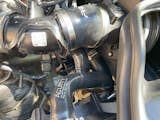Acuity Instruments
Acuity Super Reverse-Flow Silicone Radiator Hose Kit | 23+ Civic Type R FL5, 23+ Integra Type S DE5
Acuity Super Reverse-Flow Silicone Radiator Hose Kit | 23+ Civic Type R FL5, 23+ Integra Type S DE5
Earn [points_amount] when you buy this item.
No se pudo cargar la disponibilidad de retiro
Fits:
- 2023+ Honda Civic Type R FL5
- 2023+ Acura Integra Type S DE5
_______
ACUiTY's Super-Cooler, Reverse-Flow Silicone Radiator Hoses can help your Civic or Integra to run cooler while using superior materials to help better deal with increased underhood temperatures. By reversing water flow through the radiator, these hoses actually help your Civic or Integra to cool itself more efficiently.
These hoses were developed as part of a project to help HRC (Honda Racing Corporation) cool their race cars more efficiently. They were also featured on the Team Honda Research FL5s that won 1st and 2nd in class at the 2024 running of the 25hrs of Thunderhill. Shortly after the release of the FK8 Civic Type R, ACUiTY engineers determined that Honda's K20C-equipped cars could reject more heat if the water flow through the radiator is reversed. Since the FL5 and DE5 share a very similar cooling pack, ACUiTY was able to port this discovery over to those platforms as well. The additional cooling achieved is due to how the intercooler rejects heat from charge air and how that heat flows through the lower part of the radiator. In very hot conditions on cars that also have upgrades like hood venting and an upgraded radiator, water temps were reduced by as much as an additional 4.5°F (2.5°C) after installing these hoses. On totally stock cars, temperature reduction is lower, close to 1°F (0.6°C) in hot conditions. In addition to this extra cooling power, the polyester-reinforced silicone construction helps the hoses handle temperatures up to 100°F hotter than the stock EPDM rubber hoses. As an added benefit, the kit includes German-style hose clamps that have formed threads and rolled edges to help protect your radiator hoses from the cutting damage that traditional hose clamps often cause on silicone hoses. Also included in the kit is hardware to relocate the ECT2 sensor for improved accuracy of cold-side temperature reading.
Below is an illustration that shows an approximation of the temperature gradient on the radiator with the stock water-flow direction and radiator hoses. Note how (in the stock configuration) the hotter part of the radiator (top) is where the cooler air coming through the top grille comes in, while the cooler, lower part of the radiator is where the hotter air exiting the intercooler passes through the radiator. Because the water exiting the radiator is nearly the same temperature as the air entering the bottom of the radiator, this setup can render the lower half of the radiator ineffective in hot climates.

In contrast, below is an illustration that shows an approximation of the temperature gradient on the same radiator with ACUiTY's Super-Cooler hoses. By flipping the flow through the radiator, the hotter water is at the bottom, being cooled by the hot air exiting the intercooler, and the colder water exits out the top, where cool air passes through the radiator after entering through the upper grille. This reversed flow more ideally aligns the radiator thermal gradient with the thermal gradient of the air passing through the radiator which helps the radiator to dissipate heat more effectively.


